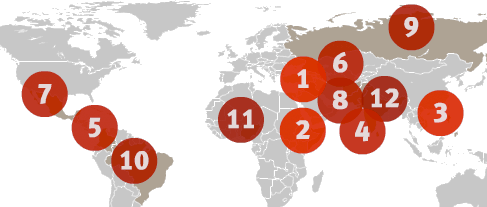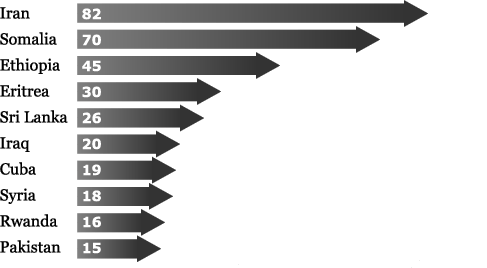In a 2006 book, the late New York Times correspondent Anthony Shadid summed up the future of Iraq as ghamidh, meaning “unclear” or “ambiguous” in Arabic. Seven years later, uncertainty continued to exacerbate the threats that journalists faced. Newspaper offices were attacked by unknown assailants, and journalists were threatened, assaulted, and detained. At least 10 journalists were killed in 2013, but the assailants and their motives were frequently unclear. For all the uncertainty and ambiguity, one truth remained clear: Central government officials and Kurdish regional authorities repeatedly attempted to silence critical voices through a combination of detentions, the denial of credentials, the suspension of television licenses, and raids of stations. Iraqi journalists continued to call for revisions to the Journalist Protection Law, which CPJ criticized for its ambiguous and restrictive provisions. In a sign of hope, the Iraqi parliament withdrew a draft Information Crimes bill that would have restricted online journalism. Still, with so much uncertainty and so little security, journalists continue to flee into exile, amid fears that Iraq could slide back into the dark days of civil war.
Iraq
» Anti-press threats and attacks increase amid violence.
» Authorities silence journalists using detentions, raids, and litigation.
In a 2006 book, the late New York Times correspondent Anthony Shadid summed up the future of Iraq as ghamidh, meaning “unclear” or “ambiguous” in Arabic. Seven years later, uncertainty continued to exacerbate the threats that journalists faced. Newspaper offices were attacked by unknown assailants, and journalists were threatened, assaulted, and detained. At least 10 journalists were killed in 2013, but the assailants and their motives were frequently unclear. For all the uncertainty and ambiguity, one truth remained clear: Central government officials and Kurdish regional authorities repeatedly attempted to silence critical voices through a combination of detentions, the denial of credentials, the suspension of television licenses, and raids of stations. Iraqi journalists continued to call for revisions to the Journalist Protection Law, which CPJ criticized for its ambiguous and restrictive provisions. In a sign of hope, the Iraqi parliament withdrew a draft Information Crimes bill that would have restricted online journalism. Still, with so much uncertainty and so little security, journalists continue to flee into exile, amid fears that Iraq could slide back into the dark days of civil war.
-
0
Murders prosecuted -
20
Journalists in exile -
0
Imprisoned journalists -
10
Stations suspended in a day
With not a single conviction in the 100 journalist murders of the past decade, Iraq remains the worst country in the world for impunity.
While some murders occurred in the anarchy of sectarian violence during the U.S.-led war, many cases could be solved today if authorities demonstrated the will. CPJ has found no sign that authorities are working to solve any of them.
For six consecutive years, Iraq has topped CPJ's Impunity Index, which calculates unsolved journalist murders as a percentage of each country's population.

| 1. Iraq 2. Somalia 3. Philippines | 4. Sri Lanka 5. Colombia 6. Afghanistan | 7. Mexico 8. Pakistan 9. Russia | 10. Brazil 11. Nigeria 12. India |
Political uncertainty, escalating violence, and direct threats have led at least 20 Iraqi journalists to flee their country in the last five years. Iraq ranks sixth in the world for journalists in exile, according to CPJ research.

Both Iraqi and Kurdish authorities continued to briefly detain journalists throughout the year, but CPJ documented no journalists in prison in its annual prison census conducted on December 1.
On April 28, the Iraqi government suspended the licenses of 10 mostly pro-Sunni satellite channels, saying in a statement that the stations had used a “sectarian tone” to incite violence against security forces and to promote “banned terrorist organizations.”
As an example of the banned stations' "unprofessional coverage," authorities cited broadcasts of a raid in the town of Hawija, outside Kirkuk, in which government forces attacked a Sunni-led demonstration against the Shia-dominated federal government. Dozens were killed in the violence.
